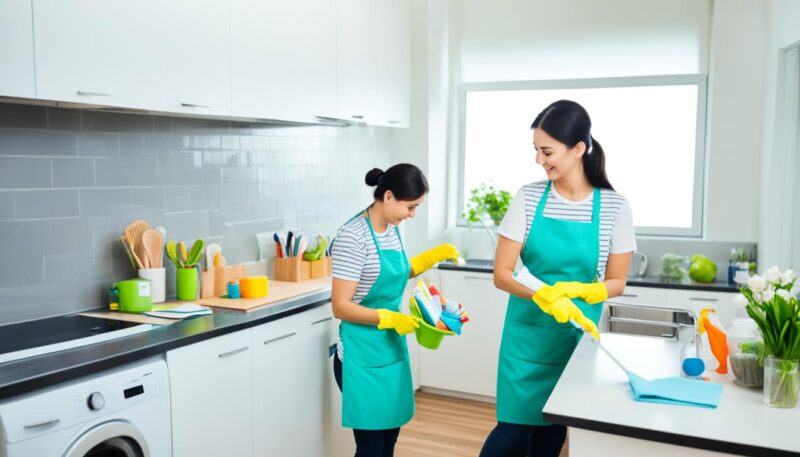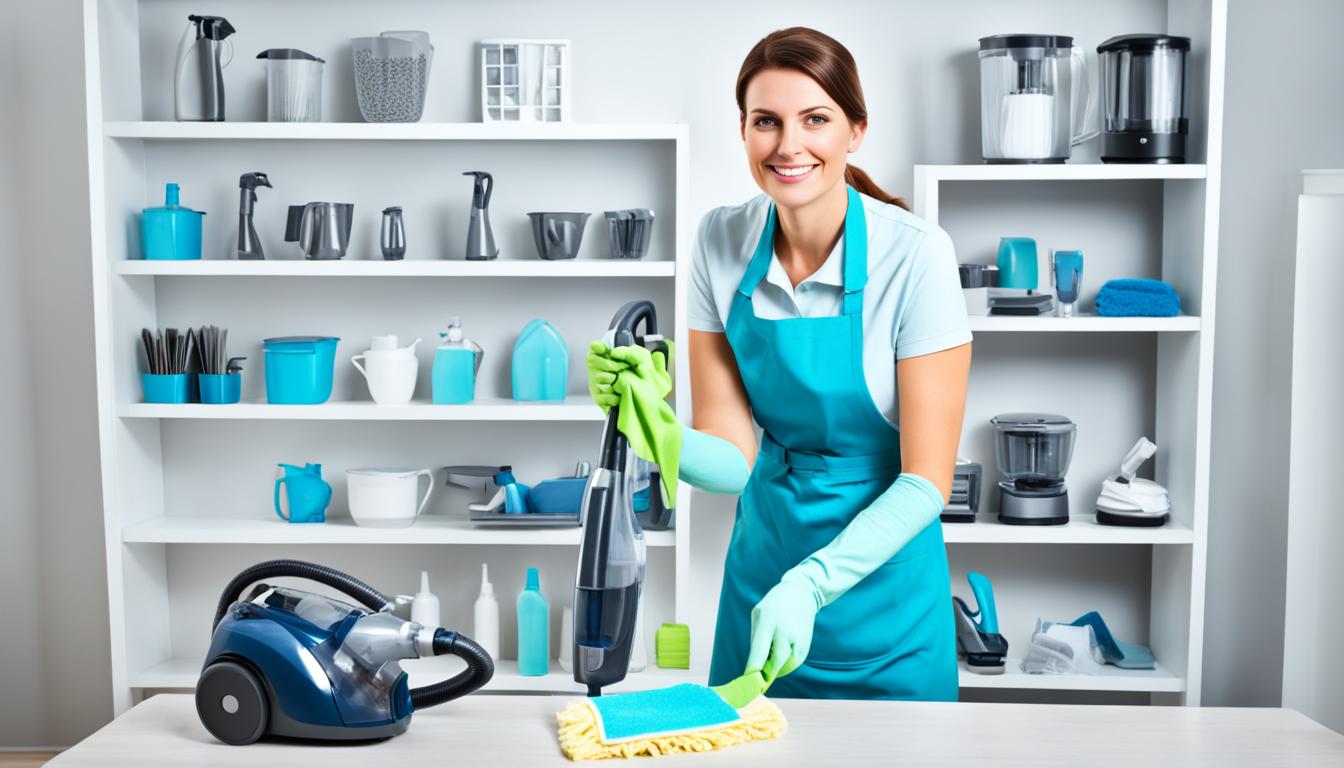Finding the quintessential domestic helper can transform a bustling household into a harmonious domicile, epitomizing efficiency and serenity. Crafting the ‘Best Domestic Helper Job Description’ serves as the linchpin in this quest, delineating the threshold between mere assistance and seamless household integration. It is this meticulous detailing that magnetizes those with consummate skills capable of ensuring efficient household management and providing top-notch childcare.
The households of today brim with multifaceted demands, ranging from the upkeep of living spaces to the developmental needs of our youngest members. A well-structured job description is not just a blueprint for potential applicants; it’s a homeowner’s strategic approach to weaving a support system that intertwines reliability with aptitude, nurturing an environment where every task is attended with both skill and heart.
It is within this framework that a domestic helper’s role ascends from the mundane to the pivotal, ushering an era where the ebb and flow of daily life are punctuated by competence and thoroughness.
Key Takeaways
- A comprehensive job description is fundamental to attracting skilled domestic helpers.
- Efficient household management hinges on detailed responsibilities and expectations.
- Top-notch childcare provision is a critical component of the domestic helper’s role.
- The job description acts as a connective tissue between household needs and helper expertise.
- Clarity in the job description paves the way for harmony and productivity in the home.
Introduction to Domestic Helpers
The essence of an experienced domestic worker can hardly be overstated in the contemporary household. As society evolves, so do the dynamics within the home; thus, the presence of a reliable home assistant becomes instrumental in maintaining household organization. Domestic workers offer much more than mere assistance with chores—they are pillars that support the intricate structure of daily life, adapting to the myriad of tasks and responsibilities that they are entrusted with.
Understanding the scope of work involved for domestic helpers is key for employers seeking to harmonize their home environments. From meticulous cleaning to the organization of living spaces, these workers bring order to chaos, creating serene and functional settings for every family member. To appreciate their role is to recognize a diverse skill set that flourishes beneath the surface of everyday life.
| Home Assistant Roles | Benefits to Household |
|---|---|
| General house cleaning | Healthier living environment |
| Laundry and wardrobe management | Efficient personal time management |
| Meal preparation and dietary management | Enhanced nutrition and family bonding |
| Care for pets and plants | Overall wellbeing and aesthetic appeal |
| Errand running and shopping | Streamlined household operations |
Moreover, the adaptability of a reliable home assistant keeps pace with the changing needs of family members, ranging from child-rearing to caring for the elderly, signifying a compassionate approach to service. The knowledge and experience they bring into household management can be seen as a lynchpin that holds the day-to-day affairs of a modern home together.
“An experienced domestic worker is not just a fixture within the home; they are a dynamic force that brings organization, efficiency, and harmony to everyday life.”
Core Responsibilities of a Domestic Helper
Delving into the core responsibilities of a domestic helper reveals a trifecta of crucial roles encompassing housekeeping, childcare, and household management. The capabilities and efficiency of domestic helpers in these areas significantly contribute to the smooth and harmonious operation of modern households, underlining the importance of clearly defined job specifications that align with these responsibilities.
Housekeeping Responsibilities
The meticulous upkeep of a residence is among the primary domestic helper duties. Housekeeping responsibilities extend beyond the basics of cleanliness and require a keen eye for detail and systematic approach to ensure every aspect of the home is well-maintained, creating a comfortable and inviting environment.
- Comprehensive cleaning of all living spaces
- Laundry, ironing, and wardrobe management
- Meal preparation adhering to dietary preferences

Professional Childcare Provider Duties
As a professional childcare provider, a domestic helper plays an instrumental role in the growth and well-being of children within the household. This position requires more than supervision; it demands a nurturing touch, educational guidance, and the cultivation of a safe, enriching environment for children to thrive.
- Creating engaging and educational activities
- Assisting with homework and school projects
- Maintaining a routine that balances fun and responsibility
Household Organization Techniques
Effective household management skills are showcased through impeccable organizational techniques that optimize space, reduce clutter, and promote an orderly home environment. A well-organized space leads to improved functionality and smoother daily operations.
| Area of Organization | Technique | Benefit |
|---|---|---|
| Kitchen Pantry | Labeling and categorizing items | Streamlines meal preparation |
| Home Office | Implementing filing systems | Enhances workflow efficiency |
| Living Spaces | Decluttering and optimizing storage | Promotes a relaxing atmosphere |
In essence, the multitiered role of a domestic helper encompasses diverse skills that holistically tend to the well-being of the household. Adeptness in these duties not only guarantees a well-run home but also ensures that the instrumental human element, so pivotal to domestic care, is preserved and cherished.
Qualities of the Best Domestic Helper Candidates
Finding a domestic helper who stands out requires identifying candidates with a blend of essential personal traits and professional skills that contribute to their efficacy as reliable home assistants and professional childcare providers. These characteristics are not just the foundation for excellent household management skills but also underpin the trust and reliability that define their roles within the family.
- Dependability: Candidates must showcase a track record of being punctual, responsible, and consistent.
- Attention to Detail: The ability to perform tasks with precision and care, ensuring that all household duties are carried out to the highest standard.
- Caring Nature: A genuine concern for the well-being of the family members, especially when it comes to being entrusted with childcare responsibilities.
- Adaptability: Flexibility to handle unexpected changes in routine or additional tasks with composure.
- Problem-Solving Skills: Aptitude for identifying issues and generating effective solutions quickly.
“A reliable home assistant is someone who is not only skilled in routine household tasks but also possesses the emotional intelligence to support the unique needs of the family they serve.”
| Quality | Contribution to Home Assistance | Contribution to Childcare | Relevance to Household Management |
|---|---|---|---|
| Reliability | Ensures smooth daily operation without supervision | Provides stability and consistency for children | Crucial for long-term maintenance of household routines |
| Attention to Detail | Keeps home in pristine condition; notices small issues before they become problematic | Aids in monitoring developmental milestones and children’s needs | Enhances the organization and efficiency of household systems |
| Caring | Creates a warm and welcoming home environment | Encourages a nurturing atmosphere; essential for children’s emotional health | Supports the emotional well-being of the family |
| Adaptability | Manages the dynamic nature of home life with flexibility | Adjusts to the evolving needs of children as they grow | Allows for smooth transitions during changes or unexpected events |
| Problem-Solving | Capable of independently resolving issues that arise day-to-day | Helps in addressing children’s challenges constructively | Key to managing the complexities of running a household |
These attributes form the cornerstone of a home environment where every member, whether adult or child, feels supported and well cared for. It is this level of comprehensive care and dedication that elevates a standard helper into a professionally recognized and deeply valued figure within the household.
Skills and Expertise for Household Management
In the complex ecosystem of a home, the domestic helper stands as a pivotal figure, wielding a suite of skills that transform everyday chaos into harmonious efficiency. As our exploration of the ideal domestic helper job description comes to a close, we focus on the critical competencies that such a professional must embody. Foremost among these are household management skills, which include but are not limited to organizing living spaces, planning meals, and ensuring all household routines run smoothly. These skills not only create an orderly environment but also foster a sense of peace and well-being among the household’s inhabitants.
Household Management Skills
The mastery of household organization is evidenced by a domestic helper’s ability to maintain cleanliness, order, and routine with seeming effortlessness. They anticipate needs, adapt to varying family schedules, and troubleshoot common domestic hiccups with creativity and poise. Their dexterity in managing finances, groceries, and the myriad details of a well-run home contributes significantly to the quality of life experienced by the family they serve.
Efficient Time Management
With the multitude of tasks at hand, efficient time management is not merely a desirable trait but a necessity for a domestic helper. This skill enables them to prioritize duties, juggle multiple activities, and allocate time wisely, ensuring that no aspect of the home is neglected. The ability to manage time well also empowers domestic helpers to find opportunities for rest and self-care, which are crucial for maintaining high performance levels in their roles.
Communication Proficiency
Last but not least, communication proficiency is the linchpin that holds the domestic aspect of a home together. A helper skilled in communication will articulate needs, preferences, and concerns effectively, fostering a collaborative relationship with the household members. This proficiency extends to listening attentively, interpreting non-verbal cues, and mediating conflicts – all of which are invaluable for a harmonious home environment. In short, a proficient communicator not only completes tasks efficiently but also nurtures the interpersonal dynamics of the domestic sphere.
